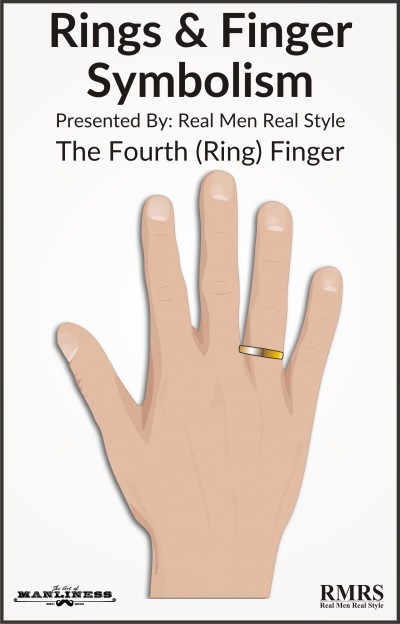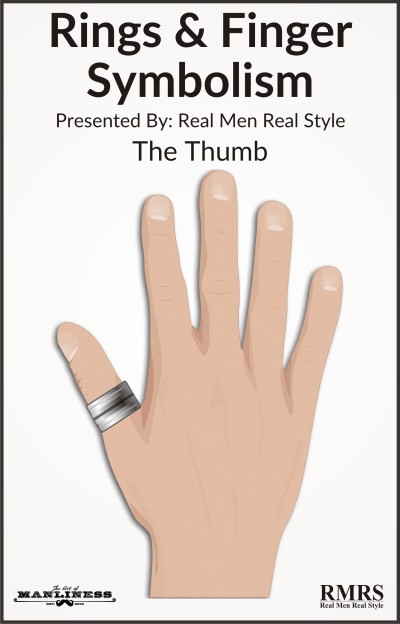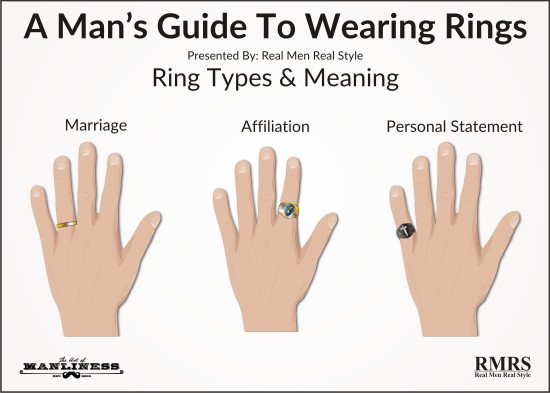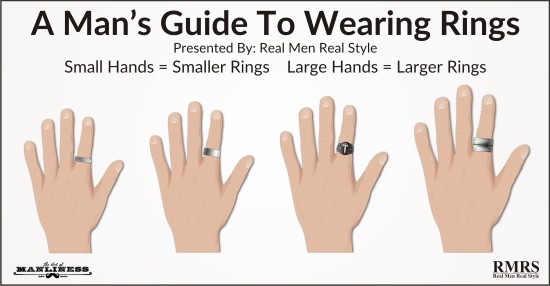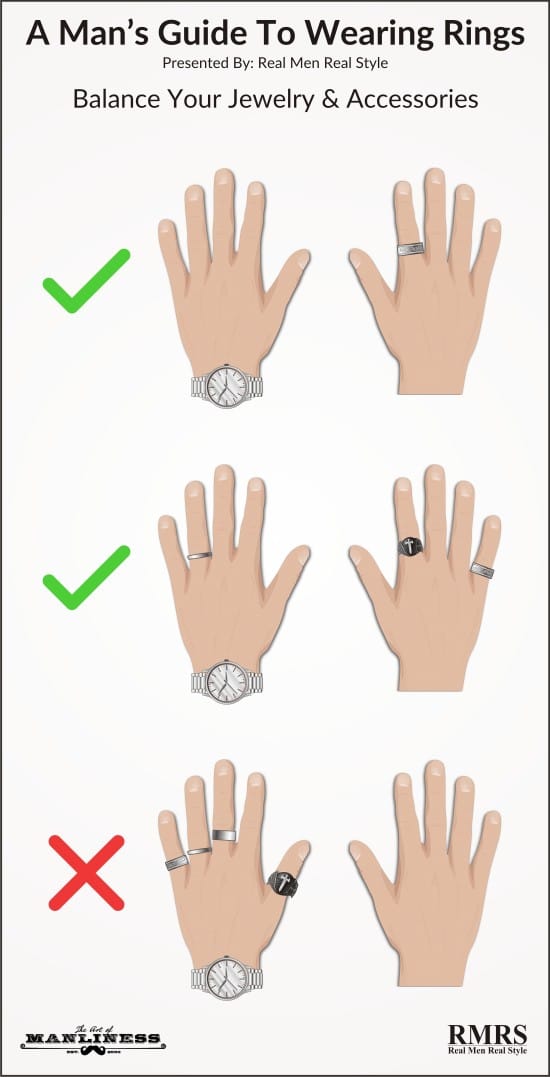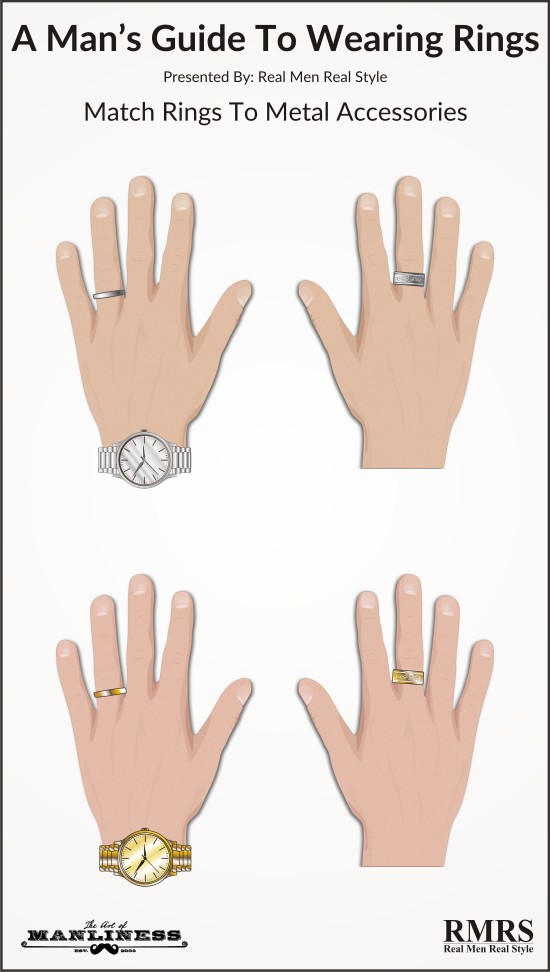Do you wear rings other than a wedding band? If so, what style? How do you think it affects the opinions of others? Do you even care? Should you?
The reality is that rings send a message. For thousands of years, men have worn them to signal status, wealth, commitment, and association. They can send the message that you’re not available, that you attended the Naval Academy (yes, I see your ring Annapolis man), that you’re part of a fraternal brotherhood, or that you’re from a culture not afraid to display wealth on the hands.
For a man especially, wearing a ring beyond the wedding band is a statement. Be aware, though, wearing a signature ring is not a statement everyone will get.
But like a lot of style choices, they’re present for the people who notice, and being part of the elite club that “gets it” is part of the fun.
The goal of this piece is to help you wear a ring (or multiple rings) with confidence. We’ll first go through the symbolism and guidelines for wearing rings on particular fingers, and then we’ll get into the 5 rules every man should follow when donning jewelry on his hands.
Ring & Finger Symbolism
Right Hand vs. Left Hand
For the most part there aren’t any ironclad rules about which hand you wear your ring(s) on.
Engagement and wedding rings are exceptions — there are a lot of specific cultural traditions — but at the end of the day there are so many cultural traditions that you’ll find different men doing different things within any diverse society. For example, most American men will wear their wedding band on their left ring finger, but a man married in an Eastern Orthodox church could end up using the right hand instead.
Some schools or organizations may have rules about how to wear their rings (in which case you’ll be told), but most will leave it up to their members.
So for most rings, don’t worry about right hand vs. left hand rules. You may, however, want to make a decision about which hand to wear a ring on, based on which hand’s symbolism fits best with the symbolism of that particular ring. The right hand is generally seen as the “physical” hand — the active, dominant one that makes most of your gestures. The left is thought of as the “mental” hand, representing your character and beliefs.
Those are based, unsurprisingly, on a right-hander’s view of the world. A left-handed man might personally find it appropriate to reverse the whole thing.
At the end of the day we’re talking about some very general concepts here — don’t be afraid to go your own way.
Let’s next look at the individual fingers and the symbology associated with them, as well as common ring choices for those fingers.
The Little (Pinky) Finger
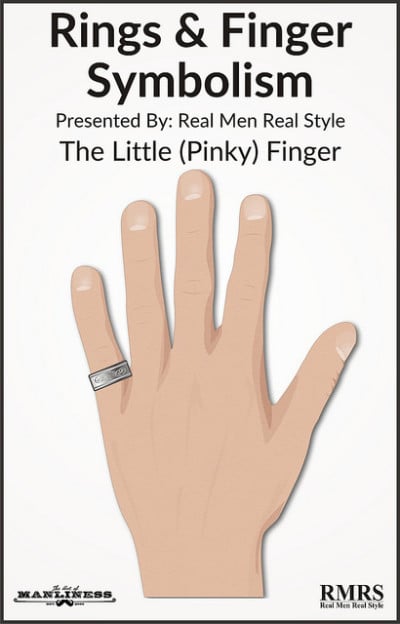 This is often the first choice for a man who wants to wear a “statement” ring.
This is often the first choice for a man who wants to wear a “statement” ring.
Pinky rings have a couple of advantages. First, they don’t have religious or cultural associations in most cultures (unlike the ring finger), though family crests are often worn on the pinky finger. And although there is a Hollywood connection between organized crime and an affinity for little finger rings, there isn’t substantial evidence to prove that wearing a ring on this finger means you’re a mafioso. The second advantage of pinky rings is that, like rings on the fourth finger, they don’t touch or interfere with the heavily-used index/pointer finger at all.
Wearing a ring on your pinky finger also isolates it from your body a bit, making it more of an eye-popping statement. As a result, pinky rings tend to be among the “busiest” or flashiest of designs. It’s where you wear things when you want attention paid to them. If you want less of that attention, wear a relatively slim ring with a subdued tone.
People who like astrological or palmistry-related symbolism will associate the little finger with Mercury, and the qualities of intelligence, discernment, and persuasion. More specifically, a pinky ring worn on the active hand is associated with intellect, along with an excellent ability to express yourself. Worn on the passive hand, it shows a strong intuition and great listening skills.
The Fourth (Ring) Finger
In much of North and South America, the ring finger is most commonly associated with wedding symbolism: a band on the right fourth finger indicates engagement, while a band on the left fourth finger indicates marriage.
Nearly all men opt for a simple ring for their wedding band; a very small percentage also don an engagement ring (called a “management” ring) before exchanging vows. In either case, a large ring with a jewel or a three-dimensional design is far less likely to be taken for something related to your marital status.
That’s not to say that people don’t wear some very unique and artistic alternatives as wedding bands, but it’s not the cultural norm. A distinctively decorative ring on the fourth finger probably won’t be assumed to be a wedding or engagement ring, while a plain metal band or one with minor, same-tone etchings or designs probably will be.
Symbolically, the ring finger is associated with the sun, the source of creativity and beauty, as well as romantic relationships (which explains its association with courtship and marriage). The sun’s metal is gold, hence it’s the traditional metal of wedding and engagement bands.
Another possible reason culture promotes commitment rings on this finger? It is the only finger that was once thought to have an unbroken artery that leads straight to the heart, essentially creating a direct connection to the heart to signify an eternal bond.
The Middle Finger
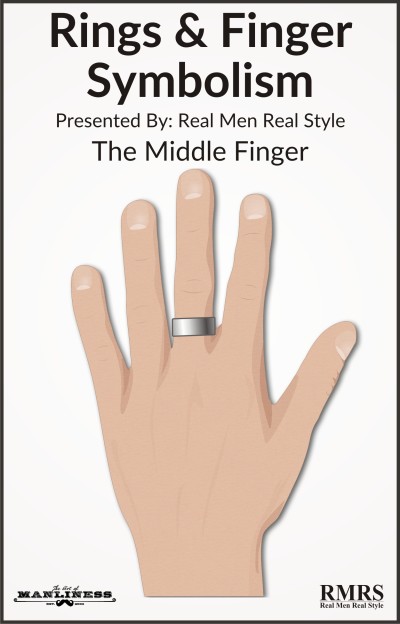 The middle finger is your largest, boldest finger. Rings worn on the middle finger are surprisingly uncommon, though. In part, that’s because it’s adjacent to the index finger, and anything bulky can be quite a hindrance to fine manual tasks. So it’s best to keep things small and simple if you’re wearing a ring on your middle finger.
The middle finger is your largest, boldest finger. Rings worn on the middle finger are surprisingly uncommon, though. In part, that’s because it’s adjacent to the index finger, and anything bulky can be quite a hindrance to fine manual tasks. So it’s best to keep things small and simple if you’re wearing a ring on your middle finger.
That said, a lot of first-time ring-wearers might feel more comfortable with the middle finger, purely because it feels so central, sturdy, and frankly, “manly.” If the idea of a pinky ring weirds you out, and you don’t want any confusion with wedding/engagement symbolism, the middle finger’s a safe default.
Because of its central location, the middle finger is held to symbolize structure, balance, conscience, and order, and is associated with Saturn. Since Saturn’s metal is lead, simple gray metals like steel are common middle finger choices.
The Index (Pointer) Finger
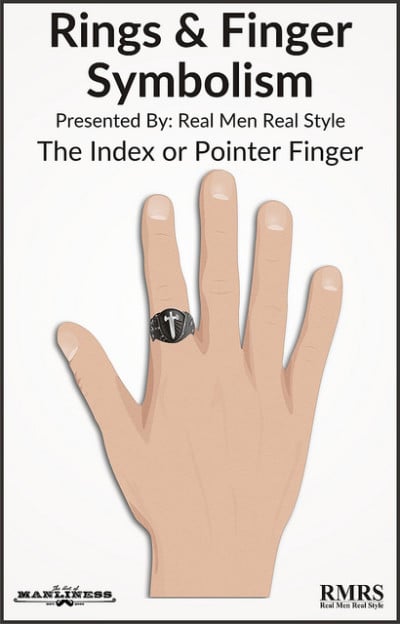 There’s a natural instinct to keep the pointer finger clear, since we use it more than any other digit (except the thumb), but it turns out that a ring on this finger doesn’t interfere as much as wearing one on the finger next to it.
There’s a natural instinct to keep the pointer finger clear, since we use it more than any other digit (except the thumb), but it turns out that a ring on this finger doesn’t interfere as much as wearing one on the finger next to it.
If you go back hundreds of years, the index finger was the most common location for a man’s ring, which was generally a signet or a crest. In some parts of Europe, people below a certain rank were actually forbidden from wearing index finger rings, because they denoted specific family status.
That makes the index finger a good place for things like class rings, fraternal rings, or family and membership crests, although many men (especially younger, unmarried men) opt for the ring finger out of habit instead.
Anything that you want to be used frequently and emphatically in your gestures can go on the index finger. It’s not as dramatically isolated as something on the outer digits (thumb and pinky), but its prominence still makes it noticeable.
The astrological association for the pointer finger is Jupiter, which symbolizes power, leadership, and authority. Men who wear a ring on this finger are believed to be unapologetic and confident. Jupiter is associated with both tin and wood. While you’ll find wooden rings out there, not many are made from tin. Still, bright silver tones inspired by the metal are a normal choice for the index finger.
The Thumb
Thumb rings have a slightly outlandish feel to people who come from conventional North American culture, but they’re actually reasonably common world-wide. In most societies a thumb ring on a man is a sign of wealth or influence, and they tend to be broad or bulky to reflect that (also to fit comfortably on the thumb, of course).
A thumb ring is also often the natural choice for men who want to wear multiple rings on the same hand, since it’s at least somewhat distanced from the others. A wedding band plus a pinky or middle finger ring can get quite crowded, both visually and physically, whereas a thumb ring gives everything some space.
Thumb gestures are associated with interaction and friendship (think “thumbs up”). Wear a ring that you want people to like — big and chunky is fine, but nothing incredibly gaudy or expensive-looking. It’s already going to be bigger than most rings, so if the design is extravagant as well, it just becomes this massive anchor dragging your hand down. Keep it bold but simple.
Because the thumb is also separated from the other four fingers, it shows an alienation of sorts, and is a good finger to choose for rings that symbolize something that makes you distinct. A thumb ring worn on the active hand also generally indicates an assertive personality.
The thumb doesn’t have a planetary association, but is seen as being positioned between Venus and Mars. It is thus symbolic of strength of character, identity, will, and self-assuredness.
The 5 Rules of Wearing Rings
Rule #1: Every Ring Sends a Message
The rings you wear send a signal.
Attended the Naval Academy, Air Force Academy, Merchant Marine Academy, or West Point? A class ring from these institutions identifies your association with some of history’s greatest soldiers, sailors, airmen, and Marines.
Want to signal power? In some parts of the world large gold rings with precious stones indicate a person of substantial wealth (and the power to protect it).
Looking for a life partner or just wanting to have fun conversation? Marriage and engagement rings play an important role in quickly telling us how far we can take a conversation with that attractive person we just met.
And make no mistake, people always notice rings. They may not say anything, but they scanned your hands within seconds of seeing you and deciding to engage in a conversation. So be careful about what messages you are sending in certain situations (interviews, conservative business settings, trips abroad) where the casual observer may have their own interpretation of what your rings mean.
People often ask me why I wear my wedding band on my right hand and not the left. The custom in the Ukrainian Orthodox Church (I married my wife in Kyiv) is to wear the wedding band on the right hand. It’s a small thing, but it leads to a conversation almost every time I meet someone new.
Rule #2: Be Confident
How confident are you in wearing additional rings?
If you’re not confident, don’t try to fake it ’til you make it. A better approach would be to wear your new ring around the house until you get accustomed to the weight and feel of it.
Next, start wearing your ring around people you trust and see if they notice. Get used to their comments before you start wearing it out in public.
Also, know the story behind your ring if there is one. Be ready to answer questions about it. Is it a family heirloom that has been passed through generations? Was it a ring that you bought on a European summer holiday that reminds you of that trip? No matter the story, your ring has the potential to be a great conversation starter.
Rule #3: Maintain Proportion to Your Hands
If you have large hands, you can wear larger rings. Men with smaller hands should balance their proportions by wearing smaller rings.
By the same token, if you have slim fingers, keep your rings compact. Broad band rings are preferable on men with fuller digits.
On the occasions when you are given a ring — a class ring at graduation, for instance — make sure you get the right size for your finger.
Rule #4: Balance the Ring(s) With Other Jewelry
How do you wear multiple rings or balance other jewelry while wearing rings? Balance it on the other hand — don’t crowd the rings together. If you are wearing a wedding band and a watch on your left hand, balance it out with a bracelet on the right wrist.
If you want to add another ring, what is your next go-to finger? Most men will choose their opposite ring or index finger.
Don’t crowd a bunch of rings, watch, and bracelets on one hand while leaving the other completely free.
Rule #5: Match Metals
There are no hard rules on matching metals when it comes to rings, as the most common ring (wedding) is fixed. However, to make life easier, I like to match metals and advocate that others adopt the system too.
Most men are content to choose between silver or gold. If you don’t have a personal preference, make a choice by whether your skin has a cool or warm tone.
Wear silver if you have a cool tone. (Your skin has a cool tone if the blue veins on your arm are clearly visible.) Wear gold if you have warmer colored skin. (In this case your veins wouldn’t be very visible.)
I personally like my rings to match my accessories as well. The metal on your belt buckle, watch strap, and rings should be in a similar tone.
By maintaining uniformity you make wearing jewelry easier. If you’re confident, though, you can break this rule as you see fit!
Is There a Maximum Number of Rings to Wear?
Assuming only one ring per finger, two or three spread out across both hands is generally a safe maximum. Go beyond that, and you are in danger of looking like a caricature. It’s best to wear one bold “statement” ring on one hand and nothing else.
Personally, I wear a plain wedding band only, on my right ring finger. I own a class ring, and have been considering a family ring.
Quality matters more than quantity, at the end of the day — no matter what finger you’re displaying your rings on.
Whatever your decision is on wearing rings, if you follow the five rules laid out in this article you’ll do just fine.
Watch the Video
____________________________
Written By Antonio Centeno
Founder, Real Men Real Style
Click here to grab my free ebooks on men’s style



